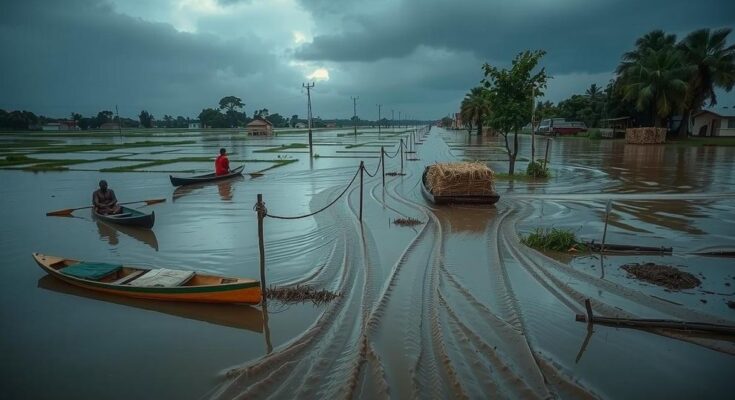South Sudan is experiencing severe flooding that has displaced over 226,000 people, submerged health facilities, and exacerbated health crises, prompting WHO’s emergency response, including the distribution of health kits and collaboration with local health authorities.
South Sudan is currently experiencing unprecedented flooding that has significantly impacted the population and health infrastructure across the nation. Reports indicate that severe inundation has displaced over 226,000 individuals, submerged homes, disrupted livelihoods, and affected key infrastructure such as roads, with damage evident in 42 of the 78 counties. Moreover, public health systems are under extreme pressure, with 58 health facilities submerged and nearly 90 others inaccessible due to blocked access routes, particularly affecting connection to the capital city, Juba. The humanitarian crisis is compounded by the influx of approximately 800,000 refugees and returnees from conflict-ridden neighbor Sudan. Concerns are rising about disease outbreaks, as evidenced by the detection of suspected cholera cases in Renk County and an alarming increase in malaria occurrences, which have surpassed 120,000, contributing to 31 suspected deaths. Reports also indicated several snakebite incidents in recent weeks. The World Health Organization (WHO), acknowledging the dire situation, has mobilized its response efforts by distributing over 88 metric tonnes of emergency health kits, capable of treating over 870,000 individuals. These kits include essential medical supplies to address the emerging health crises, such as cholera treatment and antimalarial medication. WHO is bolstering its collaboration with the South Sudanese Ministry of Health to expand emergency health services and mitigate risk to health facilities. Further, WHO is continuously monitoring the health repercussions of the flooding, focusing on the spread of waterborne and vector-borne diseases, and is engaging local communities to enhance health system resilience against climate change impacts. The agency is advocating for sustainable investments aimed at building robust health infrastructures capable of withstanding climate shocks.
South Sudan faces unique challenges due to its geographic and climatic conditions, characterized by a severe rainy season that typically occurs from April to November. This year has seen exceptionally severe flooding, attributed to the growing effects of climate change, prompting discussions about emergency preparedness and health response systems. The combination of natural disasters and socio-political instability, particularly following the conflicts in neighboring countries, has generated a complex humanitarian crisis that necessitates immediate and coordinated health interventions.
In summary, South Sudan’s severe flooding has precipitated a multifaceted health crisis impacting vast segments of its population and infrastructure. With significant displacement and rising disease incidences, the WHO has intensified its efforts by providing essential health supplies and coordinating emergency responses. Addressing the underlying vulnerabilities and enhancing health system resilience against climate change is critically needed to safeguard the health and wellbeing of affected communities.
Original Source: www.afro.who.int




